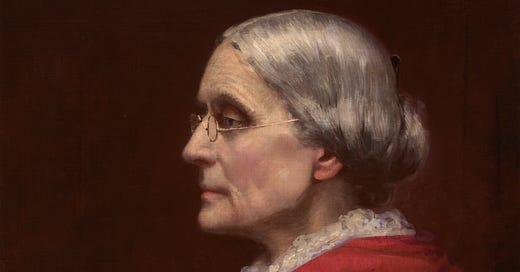"I think it [bicycling] has done more to emancipate women than anything else in the world. I stand and rejoice every time I see a woman ride by on a wheel. It gives women a feeling of freedom and self-reliance. It makes her feel as if she were independent. The moment she takes her seat, she knows she can't get into harm unless she gets off her bicycle, and away she goes, the picture of free, untrammelled womanhood." - Susan B. Anthony
Susan Brownell Anthony lived in a time when people in the U.S. questioned a woman's right to give speeches in public. At times, Susan would have to wait before speaking engagements while men debated whether it was proper for her to address an audience. Undeterred, she continued to speak in public, even at the risk of arrest.
Susan was strong-willed, energetic, a strategic thinker with discipline and organizational skills, and a mindset that "cautious, careful people, always casting about to preserve their reputation and social standing, never can bring about reform."
Born in 1820 into a Quaker family of ardent social reformers, it didn't take long for her to join reform causes. By sixteen, she was collecting signatures for petitions against slavery. In the years that followed, she organized anti-slavery meetings and conventions, wrote petitions, and even took part in the Underground Railroad. She was fearless in this pursuit, at times requiring police escorts for safety at meetings where "rotten eggs were thrown, benches broken, and knives and pistols gleamed in every direction." She never wavered.
While working to end slavery, Susan also became a leading figure in the fight for women’s equality. In 1872, she voted illegally in the presidential election — an act for which she was arrested, tried, found guilty, and fined. "You have trampled under foot every vital principle of our government. My natural rights, my civil rights, my political rights, my judicial rights, are all alike ignored," she protested. And she vowed, "I shall never pay a dollar of your unjust penalty." She never paid the fine.
Susan passed away in 1906, fourteen years before the 19th Amendment granted women the right to vote.
Sources:
Hayward, Nancy. "Susan B. Anthony." National Women's History Museum, 2017. Accessed on January 4, 2024
Interview with Nellie Bly, New York World, 2 February 1896, p. 10. & Susan B. Anthony - Wikiquote, Wikimedia Foundation, https://en.wikiquote.org/wiki/Susan_B._Anthony
“Susan B. Anthony.” Wikipedia, Wikimedia Foundation, https://en.wikipedia.org/wiki/Susan_B._Anthony
“Susan Brownell Anthony.” National Portrait Gallery, Smithsonian, https://npg.si.edu/object/npg_NPG.2019.6
The Post Standard. Syracuse, NY. February 4, 1940. p. 18., quoted in Barry (1988), p. 148 / The Trial of Susan B. Anthony by Ann D. Gordon (https://www.fjc.gov/sites/default/files/trials/susanbanthony.pdf)





Thank you, Susan! Glass ceilings shattered because of you. We remember and we fight on…